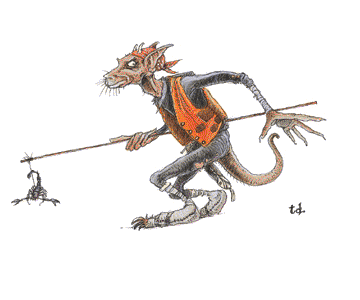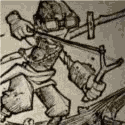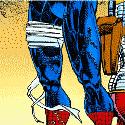|
Evil Mastermind posted:Tucker's Kobolds was pretty mind-blowing at the time because back then kobolds were just 1/4 HD critters you stopped fighting at level 3 because they weren't a threat anymore. On top of that, most combat encounters were just groups of monsters just slamming into PCs with no real planning. Besides which, this was really old school D&D, which was much more a tabletop version of Diablo, or even better, Darkest Dungeon, than what it is today. Much more game oriented. Characters could be built quickly and were basically disposable - if they died, just scratch in a new name and try again. Even the experience rules were designed with the idea that replacement characters would just drop in. For the kind of game old D&D games was, Tucker's Kobolds was good GMing. The problem with the adversarial DMing/fantasy loving Vietnam model isn't that it's inherently bad, it's that it gets used in game systems that don't work well for it and as a gotcha when the GM gets mad instead of an agreed upon feature of the game. Or that its presented as the "correct" way to play, rather than just a different one.
|
|
|
|

|
| # ? May 24, 2024 23:20 |
|
Wait, I though Gnomes were like a dwarf/halfling sorta thing? Is my memory going or did a lot of stuff get revamped after 2nd edition? I am really going to have to ransack my parent's attic and try and find my old books. Maybe try to (poorly I am sure) run a 1st/2nd game. I should have a shitload of old modules up there. I suspect that talking about old D&D might be more fun then playing it though.
|
|
|
|
Comrade Gorbash posted:Besides which, this was really old school D&D, which was much more a tabletop version of Diablo, or even better, Darkest Dungeon, than what it is today. Much more game oriented. Characters could be built quickly and were basically disposable - if they died, just scratch in a new name and try again. Even the experience rules were designed with the idea that replacement characters would just drop in. For the kind of game old D&D games was, Tucker's Kobolds was good GMing. Yea I have zero problem with meatgrinder games when the rules are built around them. It can be really entertaining to have your entire party desperately die to a bandit ambush or something only to bring your new guys almost right back into the game. The issue comes when just lovely games justify bad combat rules with 'uh it's a highly lethal game, yea, that's it' even though making a character takes forever and is annoying.
|
|
|
|
I don't think I've ever played one of those hyperlethal games before. The idea of rolling to make my character makes me a little confused, to be honest.
|
|
|
|
Davin Valkri posted:I don't think I've ever played one of those hyperlethal games before. The idea of rolling to make my character makes me a little confused, to be honest. It can be fun sometimes to find out if you're gonna be a noble, a rat catcher, or a sad russian.
|
|
|
|
Davin Valkri posted:I don't think I've ever played one of those hyperlethal games before. The idea of rolling to make my character makes me a little confused, to be honest. The best way I can describe it would be that OD&D was less a roleplaying game as we think of it now, and more of a strategy game where you happened to only control one dude. You don't care about Bob the Fighter dying quickly and violently any more than you would care about any individual GI getting shot and killed in a game of Company of Heroes. Rolling for character creation worked because it reinforced the idea of quickly stamping out stacks of character sheets while also providing just enough variation that it didn't literally feel like you were all playing the same guy over and over. As well, the stats were almost meaningless. It wasn't a big deal to roll an 9 on your INT if you only ever got a -1 to things on a 8 or lower, or a +1 to things on a 13 or higher. It's just incongruous nowadays because on top of characters taking a relatively long time to create and flesh out (and therefore subliminally causing higher amounts of a player's personal investment), the stats are extremely important. 4d6-drop-lowest doesn't fly when the difference between a 10 and an 18 is a 20% higher hit chance.
|
|
|
|
Basically ultra-lethal paranoia meatgrinder games are what gave birth to things like Roguelikes and, in a fit of recursion, are likely to appeal to the same sort of person who enjoys those sorts of games. It's RPG-as-challenge-mode, how far can you get on wit and luck and Player Skill™ before you drink the wrong potion.
|
|
|
|
gradenko_2000 posted:The best way I can describe it would be that OD&D was less a roleplaying game as we think of it now, and more of a strategy game where you happened to only control one dude.  To express it another way, the motivators in that type of game are 'exploration' and 'strategic challenge', and they barely even consider 'narrative' or 'expression' as motivators. In a game where narrative and expression is important character death is a serious problem, in a game where exploration or challenge are the main motivators it's really not because the game is about the environment rather than people.
|
|
|
|
gradenko_2000 posted:Rolling for character creation worked because it reinforced the idea of quickly stamping out stacks of character sheets while also providing just enough variation that it didn't literally feel like you were all playing the same guy over and over. As well, the stats were almost meaningless. It wasn't a big deal to roll an 9 on your INT if you only ever got a -1 to things on a 8 or lower, or a +1 to things on a 13 or higher. At 1st level, the difference between and 18 and an 8 could be loving huge, though, so your stats weren't likely to make a huge impact, but if you rolled an 18 for one of the three core combat stats(Str, Dex or Con), it could REALLY affect your character. The stats, if anything, meant more than in 3E and onwards, because there were far less non-stat ways to get bonuses, and those that were, were much more rare. You were just less LIKELY to have a stat that gave a bonus, due to the gap(roughly 8 to 14 for most stats) which was considered "human average" and didn't really yield any notable bonuses or penalties. I also still don't get why everyone assumes that OD&D through 2nd ed AD&D were hyperlethal meatgrinders for faceless mooks, I always remember getting invested in my characters and I never remember any GM's that showered us with save-or-dies haphazardly. Knights of the Dinner Table, while funny, really isn't representative of anyone's "old school" gaming experiences that I know of. Comrade Gorbash posted:The problem with the adversarial DMing/fantasy loving Vietnam model isn't that it's inherently bad, it's that it gets used in game systems that don't work well for it and as a gotcha when the GM gets mad instead of an agreed upon feature of the game. Or that its presented as the "correct" way to play, rather than just a different one. And it is inherently bad in systems without any limits on or (functional, CR doesn't count) guidelines for GM power(that is to say, basically all of them). Because it pretty much always winds down to whether the guy with infinite power will pull his punches or not. No one ever positively remembers the time that the entire party was arbitrarily killed by a collapsing ceiling in Interchangeable Dungeon #47 or that time their first level characters opened a door to find a Great Wyrm Red Dragon staring back at them from the broom closet.
|
|
|
|
It all makes so much sense! I finally understand! But why do these arguments not come out to quickly shut down the "THIS IS WOW 4 BABBYS" when the Grognard diaspora appears? I still remember when I first decided to start seriously posting in here and was like "hey I hear 4th Edition is kind of like World of Warcraft, is that true?" and the resulting assault made me want to block a half-dozen people or more. At the time tempers were still pretty flared about it, but saying "yeah, well, that is just meaningless hyperbole, 4th Edition is just an evolution of Dungeons & Dragons toward a system where every character class is balanced for in-and-out-of-combat purposes, taking another step away from the original 'roll some dice and hope something good happens and do not expect to live too long'" would have made me say "oh, O.K.!" instead of "WHY ARE YOU ALL SO HORRIBLE" It also explains why people are so wholly convinced that 4th Edition was anti-role-playing, because conversely the only "system" that was really "balanced" in earlier versions was role-playing, in the sense that you just made it up as you went along. Of course it could be the focal point of the game, it was like every game had its own houseruled mechanics to make it function since there were basically no actual rules. I am not entirely sure that any of this makes sense. Edit: PurpleXVI, I think the pure "meatgrinder"-type campaign was falling out of favor throughout the 1980s, if my oral-history-style understanding of that era of gaming is any indication. I know by the time I first played in the 1990s the games where you knew you would run through an average of a character a week were already being spoken of as the way other people's games had been in the past, and people were thanking goodness that they did not still play like that. Though of course the people that preferred that style were surely still doing it.
|
|
|
|
PurpleXVI posted:At 1st level, the difference between and 18 and an 8 could be loving huge, though, so your stats weren't likely to make a huge impact, but if you rolled an 18 for one of the three core combat stats(Str, Dex or Con), it could REALLY affect your character. The stats, if anything, meant more than in 3E and onwards, because there were far less non-stat ways to get bonuses, and those that were, were much more rare. You were just less LIKELY to have a stat that gave a bonus, due to the gap(roughly 8 to 14 for most stats) which was considered "human average" and didn't really yield any notable bonuses or penalties. I'm at least referring to OD&D where even an 18 only got you a +1 and STR didn't affect to-hit nor damage at all. Yes, I agree that stats started to matter by as soon as AD&D 1e, but it's also easily forgotten that AD&D had numerous stat generation methods beyond 3d6 in order. It's arguably Basic that was the odd man out by letting 18s give you +3 while still only having OD&D's stat generation. I also agree that while it was certainly possible to run a campaign where the DM didn't fire off save-or-dies willy-nilly and characters have multi-year campaigns, the books as written didn't support that style of play if you didn't go out of your way to avoid it. You could end up killing your players in straight-up attack vs AC combats, the dungeon level 1 random monster table includes a crab spider that inflicts a poison save or die and traps are also normally save or die's as well, to say nothing of published modules that are built like that but are intended to replace a DM having to make up an adventure by himself.
|
|
|
|
bunnielab posted:Here is an other old guy question; how is the Dragonlance setting viewed today? As a kid we dismissed it as "girl crap" but I kinda remember likening some,of the novels? Especially one that that had some lusty female dwarf merchant as a main character? When System Mastery did their episode recently about licensed games, they mentioned that the issue with a lot of licenses is that in some settings, the protagonists of that license are so powerful or influential that trying to play any other character ends up as a bit of a farce. Dragonlance really always had that issue for me, though it skips the need for a license to get there. It was mainly a world crafted for fiction instead of a game setting and inherits a lot of the weaknesses thereof. That isn't to say it doesn't have interesting ideas (having a D&D world actually be dragon-themed, tinker gnomes, uh, sailor minotaurs?), ultimately I think the target audience for it is "people who read the novels at 14 and don't ever get over them".
|
|
|
|
gradenko_2000 posted:...the dungeon level 1 random monster table includes a crab spider... You just reminded me of something. In the very first dungeon I ever made, which was the second floor under the dungeon presented in the red books and was my second session ever DMing or playing, I rolled to put in a crab spider in the first room. I foreshadowed it with webs and scary weird footprints and stuff and everyone thought it was really cool. Then I got my first TPK. We were like 8 so then we went outside to ride bikes or something. It was a while before I understood that they didn't lose to the spider because they didn't play the game very well, they lost to the spider because it's a loving bullshit monster at 1st level. Elector_Nerdlingen fucked around with this message at 07:53 on Mar 15, 2015 |
|
|
|
Alien Rope Burn posted:When System Mastery did their episode recently about licensed games, they mentioned that the issue with a lot of licenses is that in some settings, the protagonists of that license are so powerful or influential that trying to play any other character ends up as a bit of a farce. Dragonlance really always had that issue for me, though it skips the need for a license to get there. It was mainly a world crafted for fiction instead of a game setting and inherits a lot of the weaknesses thereof. That isn't to say it doesn't have interesting ideas (having a D&D world actually be dragon-themed, tinker gnomes, uh, sailor minotaurs?), ultimately I think the target audience for it is "people who read the novels at 14 and don't ever get over them". The target audience for a lot of gaming stuff is people who haven't got over stuff from when they were 14.
|
|
|
|
I tried rereading Dragons of Autumn Twilight as an adult and couldn't get past the second chapter because it locked me into a state of full cringe.
|
|
|
|
PurpleXVI posted:I also still don't get why everyone assumes that OD&D through 2nd ed AD&D were hyperlethal meatgrinders for faceless mooks, I always remember getting invested in my characters and I never remember any GM's that showered us with save-or-dies haphazardly. My experience is that first level is a hyperlethal meatgrinder, second level is dangerous, and anything after that is relatively safe. I actually really like this method as a sort of second tier of randomized character generation--you generally make a few characters, and then a random one ends up being The One that sticks with you. PurpleXVI posted:And it is inherently bad in systems without any limits on or (functional, CR doesn't count) guidelines for GM power(that is to say, basically all of them). Because it pretty much always winds down to whether the guy with infinite power will pull his punches or not. No one ever positively remembers the time that the entire party was arbitrarily killed by a collapsing ceiling in Interchangeable Dungeon #47 or that time their first level characters opened a door to find a Great Wyrm Red Dragon staring back at them from the broom closet. FFV or Tucker's Kobolds or whatever can be really really fun, but they pretty much rely on being based off of pre-written and immutable content. Like, the idea of "they have worse stats than you, but you're in their home and they're really good at trickery and tactics" is pretty appealing to me assuming that all the traps and secret passages and so on aren't just being pulled out of the GM's rear end to gently caress me over whenever I try to do anything. I really like the idea of taking 4e-style "build an encounter costing this many XP and then play it as effectively as you possibly can" encounter design and expanding it beyond the scope of a single combat encounter, but is just doesn't work if poo poo's getting made up as you go along.
|
|
|
|
Are we talkin' about kobolds I fuckin' love kobolds but I am behind lizard kobolds 100% because it gives them a good design hook dog kobolds were only worthwhile in Suikoden but there they aren't remotely tiny sneaky creatures they're just peaceful human sized dog people who live in the woods
|
|
|
|
I still have a huge soft spot for the rat-lizards who barked of AD&D 2e. Look at this little guy! He's got a scorpion on a stick! He's going to get into so much mischief!
|
|
|
|
Anyone have the picture of kobolds from a Dragon magazine article I think was called Elminster's Ecologies? That was the image the Tower of Doom video game modeled their kobolds after. They were the most human-faced (and ugliest and most bizarre) kobolds D&D had. And Record of Lodoss War kobolds > Suikoden kobolds.
|
|
|
|
The best kobolds from Hero's Quest/Quest for Glory 1, and I will not hear otherwise.
|
|
|
|
I just want to point out that Everquest, best fantasy setting, has dog kobolds.
|
|
|
|
a cool adversarial gming system could be fantasy dark souls where the PCs just spawn back in bonfires
|
|
|
|
TheLovablePlutonis posted:a cool adversarial gming system could be fantasy dark souls where the PCs just spawn back in bonfires I tried this once, the only problem was when only some of them would survive and thus sorta split the party. It was a bit annoying logistically.
|
|
|
|
If it's not a TPK then you are doing it wrong.
|
|
|
|
I like the idea of kobolds as juvenile delinquent gangs. They're dangerous to individuals and low level PCs but if your party isn't purely in it for killing they can set them straight.
|
|
|
|
Quarex posted:I still remember when I first decided to start seriously posting in here and was like "hey I hear 4th Edition is kind of like World of Warcraft, is that true?" and the resulting assault made me want to block a half-dozen people or more. At the time tempers were still pretty flared about it, but saying "yeah, well, that is just meaningless hyperbole, 4th Edition is just an evolution of Dungeons & Dragons toward a system where every character class is balanced for in-and-out-of-combat purposes, taking another step away from the original 'roll some dice and hope something good happens and do not expect to live too long'" would have made me say "oh, O.K.!" instead of "WHY ARE YOU ALL SO HORRIBLE" People who make the comparison between 4th Edition and WoW in complete innocent earnestness tend to get jumped on pretty hard because from get-go the comparison was never ever made in good faith. It was always made out to be a bad thing, specifically and especially by Ryan Dancey basically declaring that Wizards of the Coast had noticed how many people jumped ship from 3E D&D and switched to WoW to get their RPG kicks from there, and then that WOTC developed 4th Edition as a Tabletop-WoW in order to win some of that market back. The implication was that you should all play Pathfinder instead because PF stays true to D&D's heritage/tradition/roots. Without sperging out on an analysis of how WoW and 4th Edition are actually rather different from a design perspective (unless you really want to hear it), there are 2 key points to be made from trying to take the comparison seriously: 1. While I don't know if people actually did jump ship from playing D&D to playing WoW, there is some merit to the idea that people would get their "sense of community" buttons pushed by being in a guild, while adventure modules are basically the predecessors of instanced dungeons and raids. 2. 4th Edition making every class competitive and giving them an equal share of the limelight tracks closely with WoW making every class "soloable" (to varying degrees of success in Blizzard's balancing)
|
|
|
|
Worth noting that WoW isn't even THAT balanced- you can solo with all classes but it's significantly easier for some than others (Mages and Holy Priests are a bit of a pain).
|
|
|
|
I ran a 4th Edition "learn to play" table for WotC at a con a while back, and the only group I had that seemed willing to have any real fun with it were the group that had never played an RPG before and were coming in from from playing WoW. Everyone else was treating it like some super-serious life-or-death analysis of the mechanics. Me: "Okay, when you roll a natural 20, that's a critical hit and you do the maximum damage you can do on your dice." Non-WoW people: "I see. Interesting."  (nods head thoughtfully) (nods head thoughtfully)WoW people: "gently caress yeah! That's 50 damage! Suck it, drow!"
|
|
|
|
gradenko_2000 posted:1. While I don't know if people actually did jump ship from playing D&D to playing WoW, there is some merit to the idea that people would get their "sense of community" buttons pushed by being in a guild, while adventure modules are basically the predecessors of instanced dungeons and raids. So yeah once I learned a little more about 4th Edition I understood on some level why that comparison gets made, but also thought about how I am sure even in AD&D 1st Edition there would be "right" group compositions for any given module, it is just that communications technology was not sufficient for these ideas to be aggregated and settled on. Basically those weirdos hate 4th Edition for the same reason I stopped having a sense of wonder in MMORPGs by the mid-2000s, once literally everything in the game was already catalogued and ranked and all mystery was dead. Though I guess that would not explain why 5th Edition is any different. Evil Mastermind posted:Me: "Okay, when you roll a natural 20, that's a critical hit and you do the maximum damage you can do on your dice."
|
|
|
|
I kind of want to play a really lethal game one of these days. I heard Dark Sun used to be pretty brutal.
|
|
|
|
|
At least you didn't make them confirm their crit. That was the worst design decision I think I've ever seen. Let's take the only fun part of rolling a d20 and make it not happen 50% of the time. gently caress.
|
|
|
|
Quarex posted:My information was all of the #2 variety, that each class basically had similar abilities (which I am sure is not actually true, and in any case would only be a big deal if you loved caster supremacy), and that there was only one "right" party composition to get through module content, making the role-playing equivalent of a video game FAQ necessary (and that information came entirely from a guy wandering around PAX East and overhearing different groups using the same plan of attack for the module finalé). 5E is different because it pretends these limitations don't exist, which only has upsides.
|
|
|
|
Evil Mastermind posted:I ran a 4th Edition "learn to play" table for WotC at a con a while back, and the only group I had that seemed willing to have any real fun with it were the group that had never played an RPG before and were coming in from from playing WoW. Everyone else was treating it like some super-serious life-or-death analysis of the mechanics. The best part of the con RPGs I've played is when things like this happen. You get the guys going to a one shot with pregen characters and go for the serious roleplay. Then you have the guys who just want to have fun with it. It's always hilarious when the group is a mix of both. I tried Vampire once and it was half the stereotype WW player and half people wanting to enjoy it. Made for an amazing session. And of course the guys there for fun were helpful and willing to explain how things worked (the game was open to beginners with zero experience) while the serious ones just groaned every time I had questions.
|
|
|
|
Lord Frisk posted:At least you didn't make them confirm their crit. That was the worst design decision I think I've ever seen. Let's take the only fun part of rolling a d20 and make it not happen 50% of the time. gently caress. Worth noting that 4e sort of does this. A 20 is an auto-hit, but is only a crit if your 20+mods is actually high enough to hit the target. It just cuts out the confirm part. It really only ever comes into play with huge debuffs, though.
|
|
|
|
Len posted:The best part of the con RPGs I've played is when things like this happen. You get the guys going to a one shot with pregen characters and go for the serious roleplay. Then you have the guys who just want to have fun with it. I've done Games on Demand at PAX East the past two years, and it's great getting people who've never played an RPG before, or who've only played stuff like 3.Path, then running them through DW or Fate and watching them immediately go and buy the new games because "this is what I wanted <trad game> to be!" It's also interesting to point out that about 4 years ago, during the 4e era, WotC had a huge D&D presence at PAX East; there'd be about 30 or 40 tables filled to capacity with GMs running one-shots. When 5e happened two years ago, WotC stopped doing D&D at PAX East. They pawned off the 5e booth to some other company, they got maybe four tables total, and weren't even running games all day. Hell, last year at "launch" they were stuffed in a back corner of the tabletop area and had less space and traffic than GoD.
|
|
|
|
Echophonic posted:Worth noting that 4e sort of does this. A 20 is an auto-hit, but is only a crit if your 20+mods is actually high enough to hit the target. It just cuts out the confirm part. It really only ever comes into play with huge debuffs, though. I've never seen someone enforce that, but I can see how it shakes out. Generally 4e fights aren't that out of balance, so it doesn't come up that often. Anyway, making someone roll twice is asinine and a poo poo mechanic. The whole "but you still hit even if you don't confirm" platitude was the worst. Motherfucker, I only roll dice like ten times a session, and I got a 20. I want it to mean something.
|
|
|
|
Lord Frisk posted:At least you didn't make them confirm their crit. That was the worst design decision I think I've ever seen. Let's take the only fun part of rolling a d20 and make it not happen 50% of the time. gently caress. What really soured me on this was listening to RPPR's Iron Heroes campaign where one player had a Scythe with a critical threat of nat-20s-only in exchange for a critical multiplier of 4x, but he only ever got one confirmed crit in the entire run AND more than half of it was wasted on overkill since it triggered against some mook. I really liked the Glory Points mechanic from that game, though.
|
|
|
|
Particularly because back then attack rolls were the domain of martial characters and a critical hit would have been the highlight of anyone's evening. Broke up the dreary monotony of "I attack" at the very least, even if the actual effect wasn't much to write home about unless you did some crazy scythe or scimitar thing. e: the worst thing must be rolling a 20 on the fourth roll of your full attack, then having to confirm it with the lovely bonus.
|
|
|
|
Lord Frisk posted:I've never seen someone enforce that, but I can see how it shakes out. Generally 4e fights aren't that out of balance, so it doesn't come up that often. Anyway, making someone roll twice is asinine and a poo poo mechanic. The whole "but you still hit even if you don't confirm" platitude was the worst. Motherfucker, I only roll dice like ten times a session, and I got a 20. I want it to mean something. Well, confirms do help by making crits against player characters harder, since a crit against a player is a lot more meaningful than a crit against a monster. Of course, the simple solution of giving different crit mechanics to NPCs and PCs doesn't... ever really seem to cross the mind of most games in the D&D family.
|
|
|
|

|
| # ? May 24, 2024 23:20 |
|
Lord Frisk posted:I've never seen someone enforce that, but I can see how it shakes out. Generally 4e fights aren't that out of balance, so it doesn't come up that often. Anyway, making someone roll twice is asinine and a poo poo mechanic. The whole "but you still hit even if you don't confirm" platitude was the worst. Motherfucker, I only roll dice like ten times a session, and I got a 20. I want it to mean something. We enforce it fairly frequently, because we have a Bard who uses Mantle of Unity, a couple of high-defence characters, and Epic crits HURT.
|
|
|













































